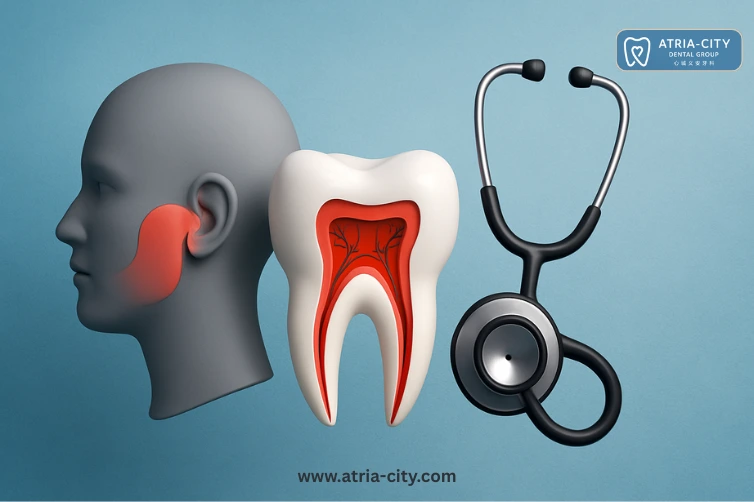Oral discomfort can take many forms — from sharp pain deep inside a tooth to persistent jaw stiffness that affects how you eat, speak, or even sleep. While many general dentists can address a wide range of issues, certain conditions require the expertise of specialists like an endodontist in Singapore or a TMJ dentist.
But how do you know which type of dental expert you need? This guide will help you identify the symptoms, understand treatment options, and decide when it’s time to seek advanced care.
What Is an Endodontist and What Do They Treat?
An endodontist is a dental specialist who focuses on diagnosing and treating issues within the tooth’s interior — particularly the pulp and root canals. These professionals have advanced training in complex procedures like root canals, retreatments, and treatment of deep infections.
Common Signs You Need an endodontic treatment:
- Persistent toothache, especially when biting or chewing
- Sensitivity to hot or cold that lingers
- Swollen or tender gums near one tooth
- Darkening or discoloration of a single tooth
- A history of trauma to the tooth
If you’re experiencing any of these symptoms, your dentist may refer you to see an endodontist Singapore to prevent the spread of infection or possible tooth loss. Endodontic treatment can often save a tooth that might otherwise need to be extracted.
Treatments Provided by Endodontists in Singapore
- Root Canal Therapy: Removal of infected pulp and sealing of the canal
- Endodontic Retreatment: If a previous root canal fails, this restores the tooth
- Apicoectomy: Surgical removal of the tip of the root for persistent infections
- Dental Trauma Management: Treatment after accidents that affect tooth nerves
The goal is to save your natural tooth whenever possible while relieving pain and preventing further damage.
What is a TMJ Dentist and When Should You See One?
TMJ (temporomandibular joint) disorders affect the joints and muscles that control jaw movement. A TMJ dentist specializes in diagnosing and treating these disorders, which can be tricky to identify because the symptoms often mimic other health issues.
Signs You May Have a TMJ Disorder:
- Jaw clicking, popping, or locking
- Difficulty opening or closing the mouth
- Chronic jaw, ear, or facial pain
- Headaches or migraines
- Tension in the neck and shoulders
- Uneven bite or change in how teeth fit together
If these symptoms interfere with your daily life, a TMJ dentist can provide a personalized evaluation and recommend appropriate therapies.
Treatments for TMJ Disorders in Singapore
A TMJ dentist may use several approaches depending on the cause and severity of your condition:
- Night Guards or Splints: To reduce teeth grinding and jaw pressure
- Physical Therapy: Targeted exercises to relax jaw muscles
- Medication: For inflammation or muscle relaxation
- Bite Adjustment or Orthodontic Treatment: To correct jaw misalignment
- Stress Management: Since stress often contributes to TMJ tension
Early diagnosis and personalized care are key to managing TMJ disorders effectively and avoiding long-term complications.
FAQs
1. What does an endodontist do that a general dentist doesn’t?
An endodontist in Singapore specializes in diagnosing and treating issues within the tooth’s pulp and root canals. While general dentists can perform basic root canals, endodontists handle more complex cases and retreatments with specialized tools and techniques.
2. How do I know if I need to see a TMJ dentist?
If you experience jaw clicking, frequent headaches, jaw pain, or difficulty chewing, you may benefit from visiting a TMJ dentist. These symptoms often indicate TMJ dysfunction that requires targeted treatment.
3. Is root canal treatment painful?
Modern root canal treatment in Singapore is typically no more uncomfortable than getting a filling. Endodontists use local anesthesia to numb the area and advanced techniques to minimize discomfort during and after the procedure.
4. What are common treatments for TMJ disorders?
A TMJ dentist may recommend mouthguards, muscle therapy, medications, or bite adjustments to reduce jaw tension and improve joint function. Treatment is often customized based on the cause of your symptoms.
5. Can I see a TMJ dentist and endodontist at the same clinic?
Yes, multidisciplinary dental clinics in Singapore offer both endodontic and TMJ services. If you have overlapping symptoms, a collaborative approach can ensure more accurate diagnosis and effective treatment.
Final Thoughts
Your oral health is more than just clean teeth — it involves the muscles, nerves, and bones that keep your entire mouth functioning properly. Whether you’re dealing with nerve pain from a damaged tooth or jaw discomfort that won’t go away, knowing when to consult an endodontist Singapore or a TMJ dentist can make all the difference in your recovery and long-term comfort.
If you’re unsure which path to take, start with a dental consultation and let your provider guide you toward the right specialist. Acting early often leads to faster relief and better outcomes.


Leave a Reply